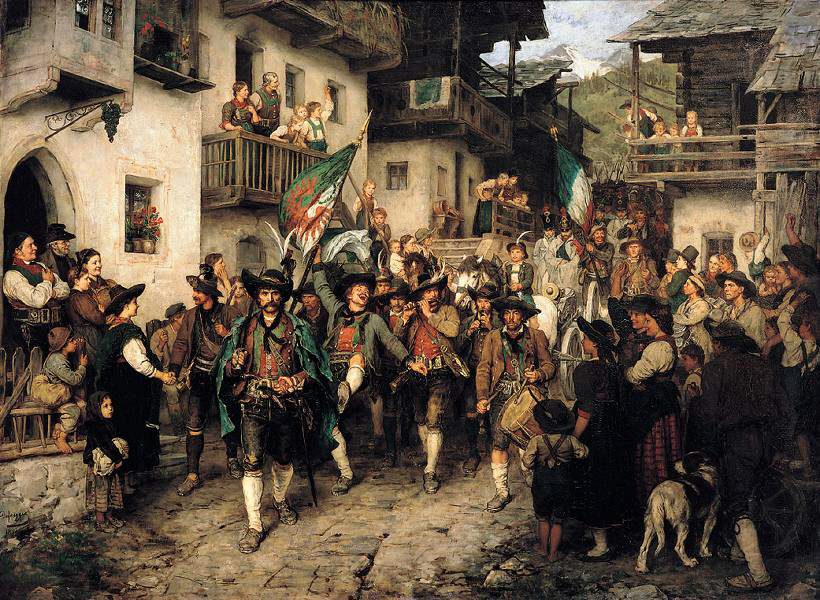
Tyrolean Rebellion
The Tyrolean Rebellion (German: Tiroler Volksaufstand) is a name given to the resistance of militiamen, peasants, craftsmen and other civilians of the County of Tyrol led by Andreas Hofer supported by his wife Anna and a strategic council consisting of Josef Speckbacher, Peter Mayr, Capuchin Father Joachim Haspinger, Major Martin Teimer and Kajetan Sveth, against new legislation and a compulsory vaccination programme concerning smallpox ordered by King Maximilian I of Bavaria, followed by the military occupation of their homeland by troops organised and financed by Napoleon I of the First French Empire and Maximilian I.[2][3] The broader military context is called the War of the Fifth Coalition.
Backgrounds[edit]
Governing and military situation[edit]
In September 1805 the Electorate of Bavaria under Prince-elector Maximilian IV Joseph, that had been allied with the Habsburg monarchy under the common federally structured Holy Roman Empire, went over to Napoleonic France: the Bavarian Minister Count Maximilian von Montgelas, realizing the French superiority while fearing the ambitions of the newly established Austrian Empire, signed a secret defence alliance at Bogenhausen. At the end of the War of the Third Coalition shortly afterwards, Bavaria found itself on the victorious side. In 1805 the warring parties agreed the Peace of Pressburg, where Bavaria was elevated to a kingdom and gained French-occupied Tyrol, which since 1363 had been held by the dynasty of the Habsburgs, who, defeated by Napoleon at the Battle of Austerlitz, were forced to renounce it. Napoleon officially handed over the Tyrolean county including the secularized Prince-Bishopric of Trent (Trentino) to the Bavarian king on 11 February 1806.
Policies[edit]
In its policies and legislation, the Bavarian government under minister Count Montgelas angered the Tyrolean population in several ways. By writing new rules, by reorganising the schooling system, by abolishing the ages old Tyrolean people's right to selfdefence (Wehrverfassung) and by raising taxes, but at the same time barring exports, e.g. of cattle, from Tyrol into Bavaria.[4][5] Furthermore, the state mingled into the affairs of the church in Tyrol, banning traditional rural holidays, the ringing of church bells, processions etc. which were a vital part of Tyrolean culture. Additionally, on 1 May 1808, the County of Tyrol was disestablished and administratively split up into the three districts of Inn, Eisack and Etsch. The new Bavarian constitution also replaced long existing feudal rights that had given privileges to the Tyrolean population, such as not having to fight in a foreign army and outside the Tyrolean borders. Conscription was thus introduced in Tyrol and Tyrolese called into Bavarian military service, which led to open revolt. Also because Bavaria had to deliver soldiers for Napoleon's devastating wars in Russia and Spain, which were more or less one way tickets.[5] On top of this the Bavarians ordered a compulsory vaccination programme against smallpox in 1807, with massive fines for refusal.[6] For the Tyroleans this was pure blasphemy.